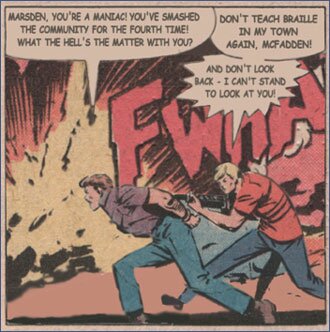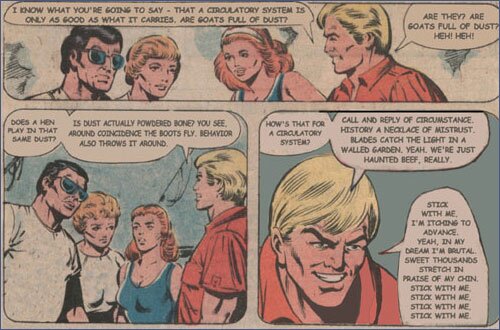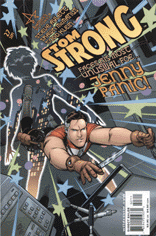      |
An interview with Steve Aylett
| Read this? Excellent, isn't it? It's an extract from "LINT", by Steve Aylett. Here at Goaste, we didn't know much about Steve, so we decided the best way to find out more was to ask the man himself. Here's what he said to Luke... |

|
Goaste: For the idiots among us (more specifically...us), could you give us a brief summary of who you are, what you do, and your work to date? Steve Aylett: I've been having books published for ten years, including Slaughtermatic and most recently LINT. I think there's twelve published so far. At the core most of them are satirical books in the tradition of Voltaire, but my style is very rich, colourful and strange to the point where many readers only see the weirdness and not the intent behind it. I like originality, ideas that haven't been written before, and characters who are individual to the point of being in a parallel dimension. I think dogs are funny, and moths can also be interesting occasionally. G: How does being synaesthetic affect the way you write? What do you make of other media attempts to recreate the synaesthetic 'experience' (the computer game Rez, for example)? SA: I think the sound/colour thing has been done quite well in movies and so on, all the way from those early cartoons that show visual equivalents of jazz, up to screensaver-like displays that are generated by music. But the sound/colour thing is the easiest bit to do and even there they leave out or get wrong the shape and texture aspects. They're a bit cliched in the sort of shapes they think certain sounds will make. Having said that, I think actually the synaesthesia thing is alot more common than people think - I suspect most people see music as colours and structures, but they edit that idea out and tell themselves that sound is just sound. When you listen to music, don't you at least see flurries of colour and shapes in your mind? I just think some people are more conscious of it than other people. The way it affects my writing is, for one, in the way stuff is described, which I suppose is heightened, but the more interesting part for me is in the structure of arguments. There are people who can do mathematical tasks instantly because they're seeing the structure of the whole thing and just looking at the area where the conclusion is. I can do that with a philosophical argument, unfortunately, or with an idea. So long as I have all the information relevant to the subject I can look at someone's argument on a certain subject and, if there's a hole in their argument, I visually see the hole as a hole in that structure. Ofcourse if I've got bad or missing information I'll get it totally wrong. Mostly I can't be bothered to translate the hole back into words to explain it because it seems obvious. And very often, ofcourse, I'm hearing the same argument over and over through the years and seeing the same hole, so it's just boring. It's amazing how boring it gets. New arguments present more exciting shapes. That's why finding (or creating) a new idea is like a treasure, and it really is a rarity, especially these days when originality is damn near against the law. It's also easy to see when a supposedly new idea is an old one using new terms - it has the same shape. There are alot of those at the moment. 
G: Reviews of your work tend to sway wildly from "Genius" to "Unreadable". Do you pay much attention to reviews? Do you ever feel pressured to alter the way you write for wider acceptance? SA: It varies, how much I look at reviews. I didn't really look at reviews for the Accomplice books, though I can imagine. Recently I've looked at reviews again, so I've seen some for LINT. It's difficult to know how much good and bad it does. They're very subjective, obviously. Most of the reviews I get are very positive, and I get loads of them, but I suspect it has hardly any effect on sales. I've noticed that generally the better reviews are better written and the bad reviews are badly written - maybe that says something. In regard to how they effect me, a bad review might affect me for a little while, and so will a good review, but neither have any lasting effect on me, and no effect atall on my writing. I once tried writing a normal book, and it just didn't hold my interest. It seemed absurd to be deliberately stripping out or withholding the interesting and original stuff, and deliberately having these characters be boring and easily led and unable to innovate. It was dead, to me, and I only lasted for a few short chapters. Which is a shame, because several publishers were interested. I've had more inquiries about that little vacuum than about any of my alive-and-kicking books. There's a thing I said about Jeff Lint in an unpublished story I wrote about him: 'Lint knew that his use of originality as the basic building unit of a book would result in the perception of at least two different versions of the book among readers - the bifurcation would begin with readers who accepted and included diversity, and those who deemed difference an exception which need not be factored in. The first would perceive richness, the second emptiness, and perceptual graduation in between and beyond would aggregate from there. Thus Lint brought not peace, nor a sword, but a dicer. Or, more accurately, he revealed the varied prejudices of perception that already existed.' So it's not for everyone. And, unfortunately, most people really and genuinely don't want anything new or original. Which is fine. I just wish they wouldn't claim that they do. G: Do you regard what you do as your job, or as your art? If art, do you feel a need to further the artform? SA: I don't think of it as either of those things. If I had to choose one I'd say art but I don't really use that term. And yes, I certainly want to do things that other people haven't done in their writing. That's virtually all I do. 
G: Do your political beliefs feature heavily in your work? SA: It's certainly there, though most people seem to miss it entirely. I talk a lot about systems of manipulation and inherited assumptions of power. The Accomplice books were almost entirely about that. If I was to be bunged into any one category of writing I would want it to be that of satire, the old-time real satire that no-one else really does these days. It's so rare, that people barely know how to read or recognise it any more. Also, satirical mechanisms depend upon a certain degree of self-honesty in the reader � it needs that to work. So increasingly, satire doesn't have a handle to latch onto. A mirror holds no fear for those with no shame. The main problem, though, is that in the west it's still generally thought that if something's funny, it isn't serious. So when my characters are inflating their heads with bicycle pumps and so on, it can't possibly be a criticism of the state. Added to this is the fact that I sometimes like to just goof off, so sometimes those scenes of head-inflating aren't a criticism of the state anyway. Characters will remove the skin from their skull like a glove in the middle of conversations. I like for dogs, hens and badgers to wander through scenes occasionally � it just makes it more interesting for me. Badgers are good for almost anything. G: How much work went into creating a character to the depth that you did so with Lint? Did you run into any trouble with the amount of real-world references in the book (namechecking Johnny Depp, etc)? SA: Jeff Lint came about fully-formed. Looking back though, I suppose he's a bit like me plus PKD and then made a bit funnier and more confrontational. A bit of Hunter Thompson. There's some Captain Beefheart in the chapter on the Energy Draining Church Bazaar concept album. And that thing with the biography on his book claiming that he had died, was something that actually happened to Mike Moorcock during the seventies. Strangely, after LINT was written, Alan Moore mentioned an old pulp writer called Harry Stephen Keeler, who as far as I know really existed, and was extremely Lint-like (in terms of writing strange books irrespective of what anyone thought). Keeler was a terrible writer though, much worse than Lint. Keeler actually came up with some good ideas sometimes, but because he basically couldn't write, the execution of those ideas was disastrous. But I'd never heard of Keeler when I wrote LINT. The namechecking is harmless, and in LINT it's almost never in a piss-taking context anyway. 
G: Tell us about writing your edition of Tom Strong. Is it too cynical to suggest that our "Alan Moore vs Hollywood" article is anything approaching accurate? SA: I had had the idea of the Jenny Panic character for a long time, as an idea for a Shadow-like comic character, but comic companies never call me back on these things, so when Alan asked me to do a Tom Strong, I put her in there as the villain. It ended up being more traditional than it would have been otherwise, as Tom Strong sort of had to win. I suspect if I'd written it in some other context, Jenny Panic would have continued with her good works. What happened to her in the comic was quite dis-empowering. Still, it was a fun ride and I enjoyed writing it, and seeing how it was drawn. The middle pages in 'exaggerated comic world', where Dhalua has huge tits and everything is going wrong, are really good. I think your analysis of the Alan Moore/Hollywood situation is about right. The movie of From Hell was basically just a standard Jack the Ripper movie, nothing special. The League movie was CGI toytown, and i don't have great hopes for Vendetta. I know it won't be Alan Moore's comic, it'll be something else - the question is whether that something else will be any good. From what I've heard of the script, and judging by the Wachowski's past stuff, I suspect not. They seem to miss the point a lot, and miss really good opportunities. But I think it'll be really popular partly for that reason. G: Finally, which of the following most accurately describes you? a) WHISTLEPIPE MAGNITUDE b) eeeeeeeerie c) non-magical denomination d) cat-voc SA: Definitely cat-voc. I'm surprised you felt the need to ask. |

| More information about Steve Aylett, and the books he's written, can be found at his website. In addition to taking the time to talk to us, Steve replied incredibly quickly, and should be classified as dismayingly prompt. |

    |